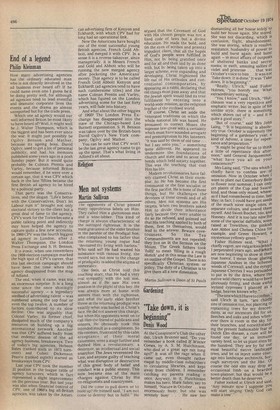Religion
Men not systems
Martin Sullivan
Inc opponents of Christ pinned many opprobrious labels on Him. They called Him a gluttonous man and a wine-bibber. This kind of charge is always characteristic of the outraged righteous. It is the main gravamen of the elder brother in the parable of the Prodigal Son, who complained to his father that the returning young rogue had "devoured thy living with harlots." Who said so? He had wasted his substance with riotous living, the record says, but now to the charge of prodigality is added the stigma of immorality.
One feels, as Christ told this touching story, that He had a very real sympathy with the lost son, almost as if He saw His own position in the plight of this boy. He was always more at home with sinners than with the righteous, and what the surly elder brother threw at the returning prodigal was exactly what was hurled in Christ's face. He did not answer this charge, but when His opponents went on to call Him the friend of publicans and sinners, He obviously took this intended insult as a compliment. So His enemies, frustrated by this calm acceptance of their moral calumnies, went a stage further and dubbed Him a revolutionary, a destroyer, an intellectual and social anarchist The Jews reverenced the Law, and anyone guilty of teaching what was disruptive or destructive of this great body of belief and conduct was a' public enemy. This now became one of the main charges against Christ by His co-religionists and countrymen.
Did He come to pull down or to build up? He himself said, "I am not come to destroy but to fulfil." He argued that the Covenant of God with His chosen people was not a fixed code of laws but a divine education. He made the bold, and (in the eyes of -scribes and priests) impudent claim, that all the hopes of God's people were fulfilled in Him, not by being gratified once and for all and then laid by as done with, but by being taken up into a larger scheme, ever expanding and developing. Christ frightened the life out of His orthodox and conventional contemporaries, by appearing as a rabbi, declaring that old things must pass away and that the Jewish spirit would find its true fulfilment by entering into a world-wide mission, as the religious teacher of the civilised world.
Of course, Christ set aside the venerated traditions on which the whole national life was based. He presumed to correct Moses the supreme law-giver with a certainty which must have sounded arrogant and presumptuous to His listeners. "It was said by them of old time.
but I say unto you," — something quite different. He appeared to
undermine the foundations of church and state and to sever the bonds which held society together. This was the teaching that cost Him his life.
Modern revolutionaries have falsely claimed Christ as their exem plar. So He has become the first communist or the first socialist or the first pacifist. He is none of these
things, but He challenges the,
devotees of these creeds and of all others. Men not systems are His targets, When two brothers asked
Him to divide their inheritance fairly because they were unable to
do so He refused, and pointed Out that His teaching applied by both of them, first to themselves, would lead to the answer. Beware cove tousness, So the Ten Commandments are not repealed; they live on in the Sermon on the Mount. The Greek fathers took 'fulfil' to mean 'filling in a rough sketch' and in this sense the Law is an outline of the Gospel. There is no specifically Christian system or policy. The duty of a Christian is to give them all a new dimension.
Martin Sullivan is Dean of St Pouts


































 Previous page
Previous page